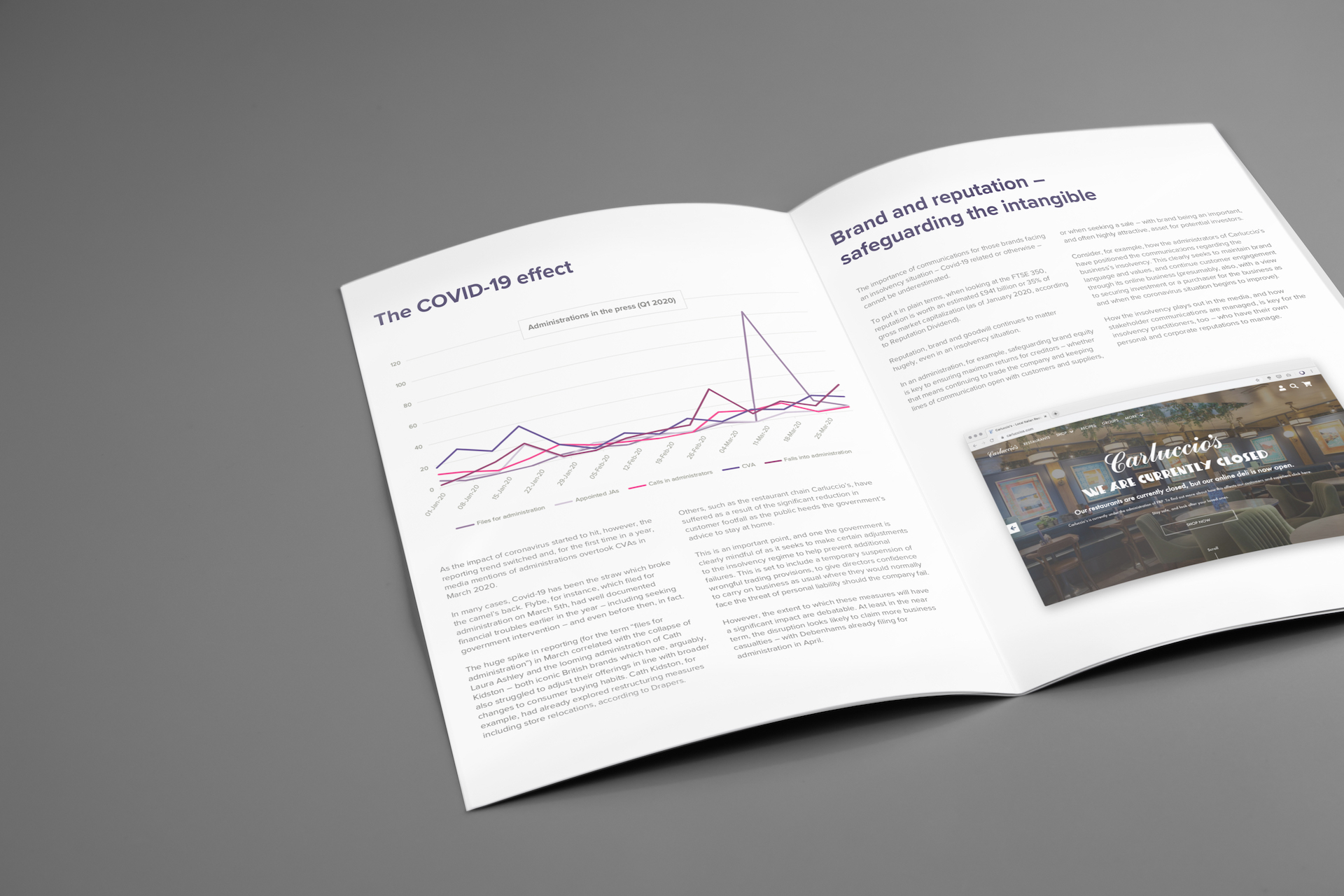Business restructuring and COVID-19
April 9, 2020 • 8 minute read
As the coronavirus crisis continues to take its toll, the economic impact is being keenly felt across almost every industry in the UK.
Statistics from EY suggest that there have already been more than 200 profit warnings directly related to coronavirus in 2020. This compares to an annual total in 2019 of 313 (itself the highest since 2015) and 89 in Q1 2019.
All businesses are seeking to mitigate the impact of the pandemic on themselves and on their wider communities (including staff, customers, shareholders and other stakeholders), and most are looking to shore up their cash position by cutting costs, redirecting resources and taking advantage of the support mechanisms put in place by the government where they can.
But the fact of the matter is that short-term pain will be felt by the large majority, and there will be some businesses chalked up as casualties to the coronavirus. Clearly, some sectors and business types are at higher risk than others as consumers stay indoors and significantly reduce their discretionary spend. The retail industry, already struggling to navigate through its own restructuring, is facing a particularly uncertain near-term future.
We are already seeing a number of professional advisory firms, including law firms such as Hogan Lovells, pivot away from BAU services to establish or expand their dedicated insolvency and restructuring offerings – which is a sobering thought.
Communicating in times of business distress
Brands going through an insolvency process – whether that is a formal administration or a restructuring measure such as a Company Voluntary Arrangement (CVA) – face distinct challenges, and not all of them financial.
There are important reputational factors to consider which can only be addressed by effective communications. Chief among these, perhaps, is that there is a significant appetite in the media for stories of business travails.
We have previously looked at the trends in media reporting around administrations and of CVAs (Call in the administrators and The age of the CVA: Insolvencies in the media). While the press may be, at present, slightly more sympathetic and understanding of the current situation, it is still of critical importance for businesses, and their advisers, to have a media strategy in place for communicating the facts and implications of an insolvency. This is critical not only to ensure factual and accurate reporting of what are often highly complex matters, but also to preserve wherever possible brand value and goodwill.
As we highlighted in our 2018 report, there tend to be a number of stock phrases which the media use when reporting on insolvencies, particularly administrations. In the context of the current challenges presented by the COVID-19 pandemic, an analysis of the media usage of these terms between March 2019 and March 2020 is particularly revealing.
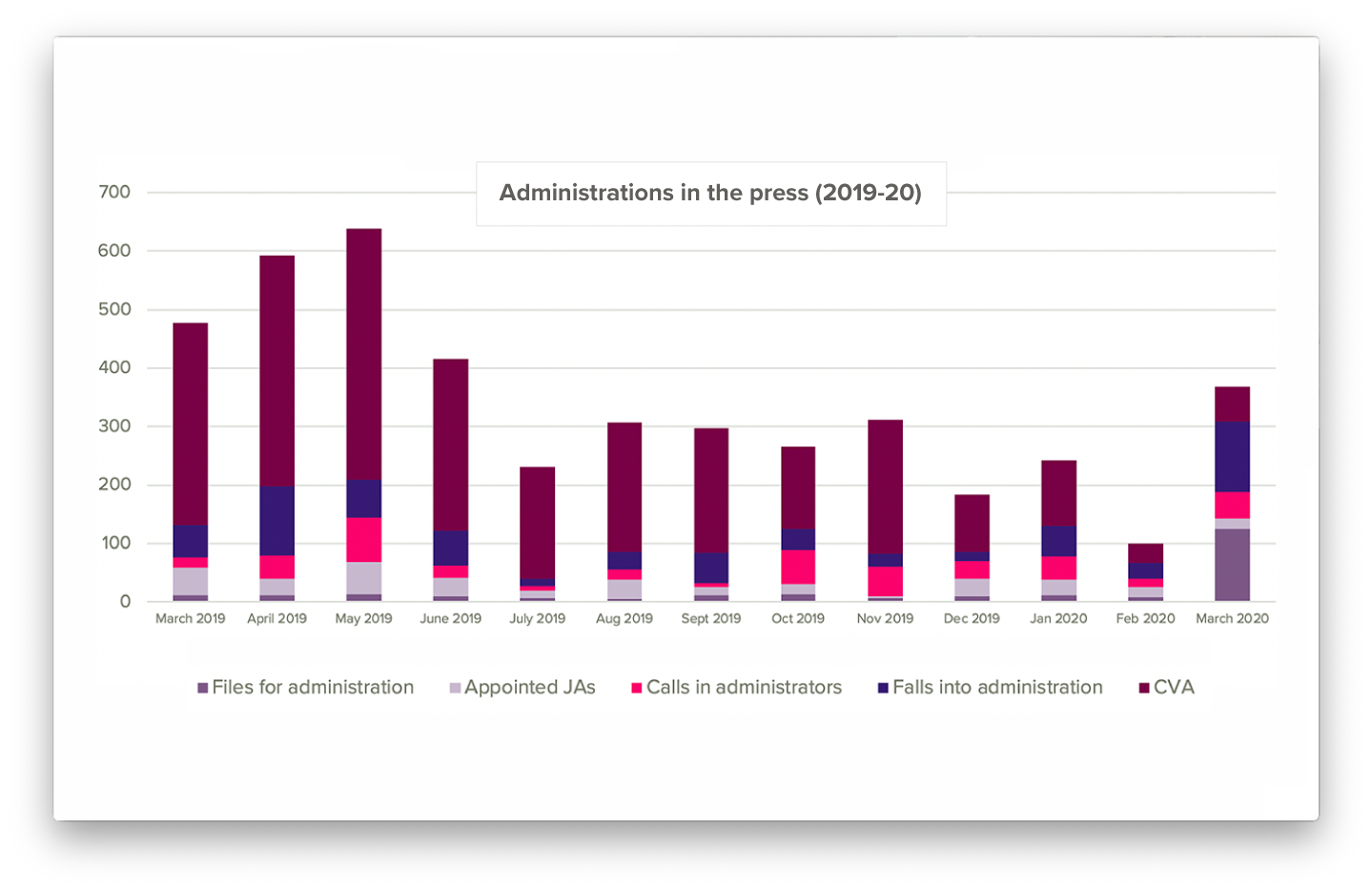
Press attention on insolvencies before January 2020, and indeed for a time before that, has been almost exclusively given over to reporting on CVAs.
This is not surprising given the brand names involved, with the spike in reporting seen in May 2019 driven at least in part by the restructuring of Arcadia, and the demands made by The Pensions Regulator of Sir Philip Green.
The increase in big name brands looking at or implementing CVAs then had well publicised knock on effects for the big retail landlord investors, with rents at British Land and Intu being significantly affected – which garnered widespread media coverage.
The COVID-19 effect
As the impact of coronavirus started to hit, however, the reporting trend switched and, for the first time in a year, media mentions of administrations overtook CVAs in March 2020.
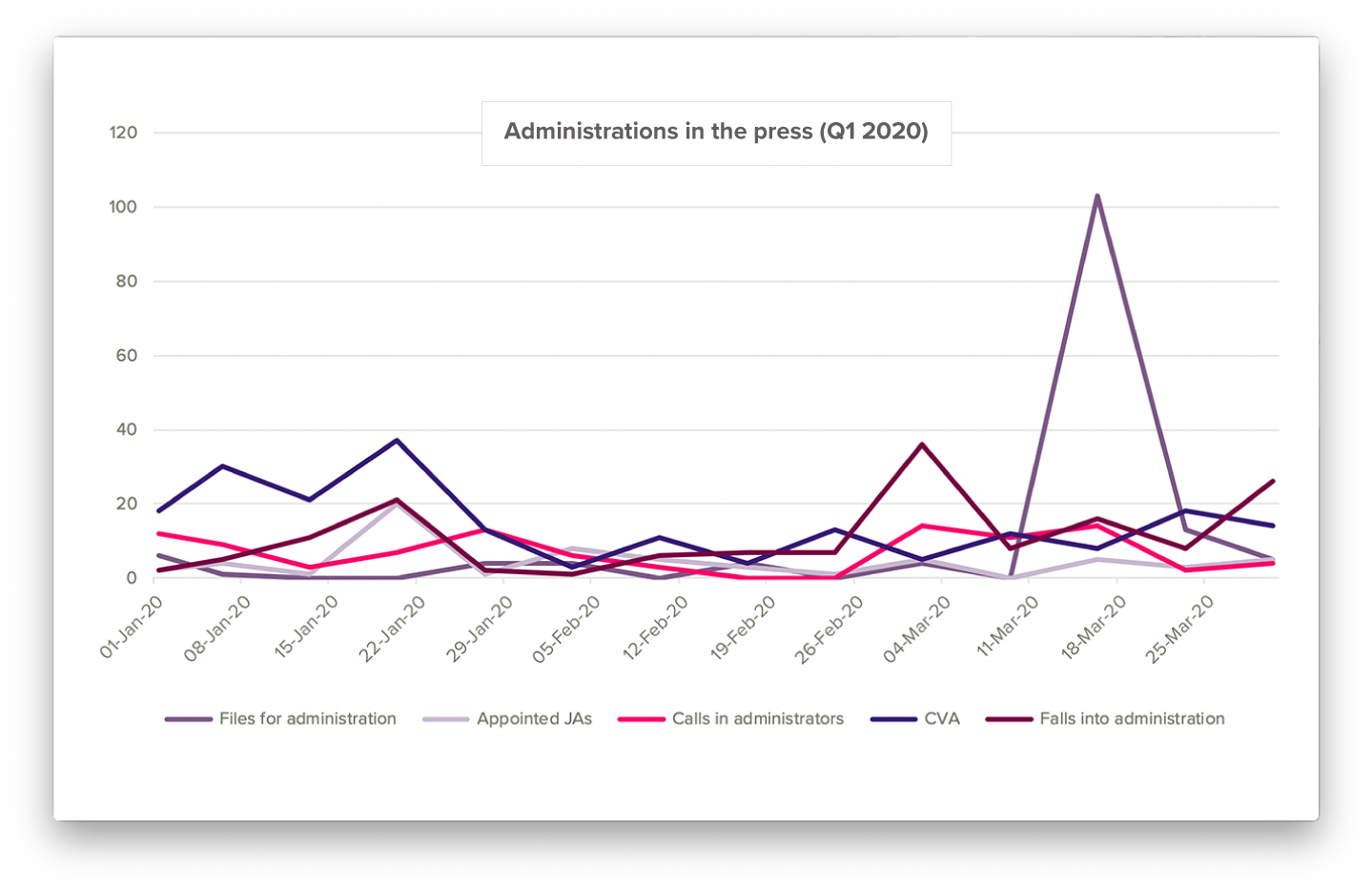
In many cases, Covid-19 has been the straw which broke the camel’s back. Flybe, for instance, which filed for administration on March 5th, had well documented financial troubles earlier in the year – including seeking government intervention – and even before then, in fact.
The huge spike in reporting (for the term “files for administration”) in March correlated with the collapse of Laura Ashley and the looming administration of Cath Kidston – both iconic British brands which have, arguably, also struggled to adjust their offerings in line with broader changes to consumer buying habits. Cath Kidston, for example, had already explored restructuring measures including store relocations, according to Drapers.
Others, such as the restaurant chain Carluccio’s, have suffered as a result of the significant reduction in customer footfall as the public heeds the government’s advice to stay at home.
This is an important point, and one the government is clearly mindful of as it seeks to make certain adjustments to the insolvency regime to help prevent additional failures. This is set to include a temporary suspension of wrongful trading provisions, to give directors confidence to carry on business as usual where they would normally face the threat of personal liability should the company fail.
However, the extent to which these measures will have a significant impact are debatable. At least in the near term, the disruption looks likely to claim more business casualties – with Debenhams already filing for administration in April.
Brand and reputation – safeguarding the intangible
The importance of communications for those brands facing an insolvency situation – Covid-19 related or otherwise – cannot be underestimated.
To put it in plain terms, when looking at the FTSE 350, reputation is worth an estimated £941 billion or 35% of gross market capitalization (as of January 2020, according to Reputation Dividend).
Reputation, brand and goodwill continues to matter hugely, even in an insolvency situation.
In an administration, for example, safeguarding brand equity is key to ensuring maximum returns for creditors – whether that means continuing to trade the company and keeping lines of communication open with customers and suppliers, or when seeking a sale – with brand being an important, and often highly attractive, asset for potential investors.
Consider, for example, how the administrators of Carluccio’s have positioned the communications regarding the business’s insolvency. This clearly seeks to maintain brand language and values, and continue customer engagement through its online business (presumably, also, with a view to securing investment or a purchaser for the business as and when the coronavirus situation begins to improve).
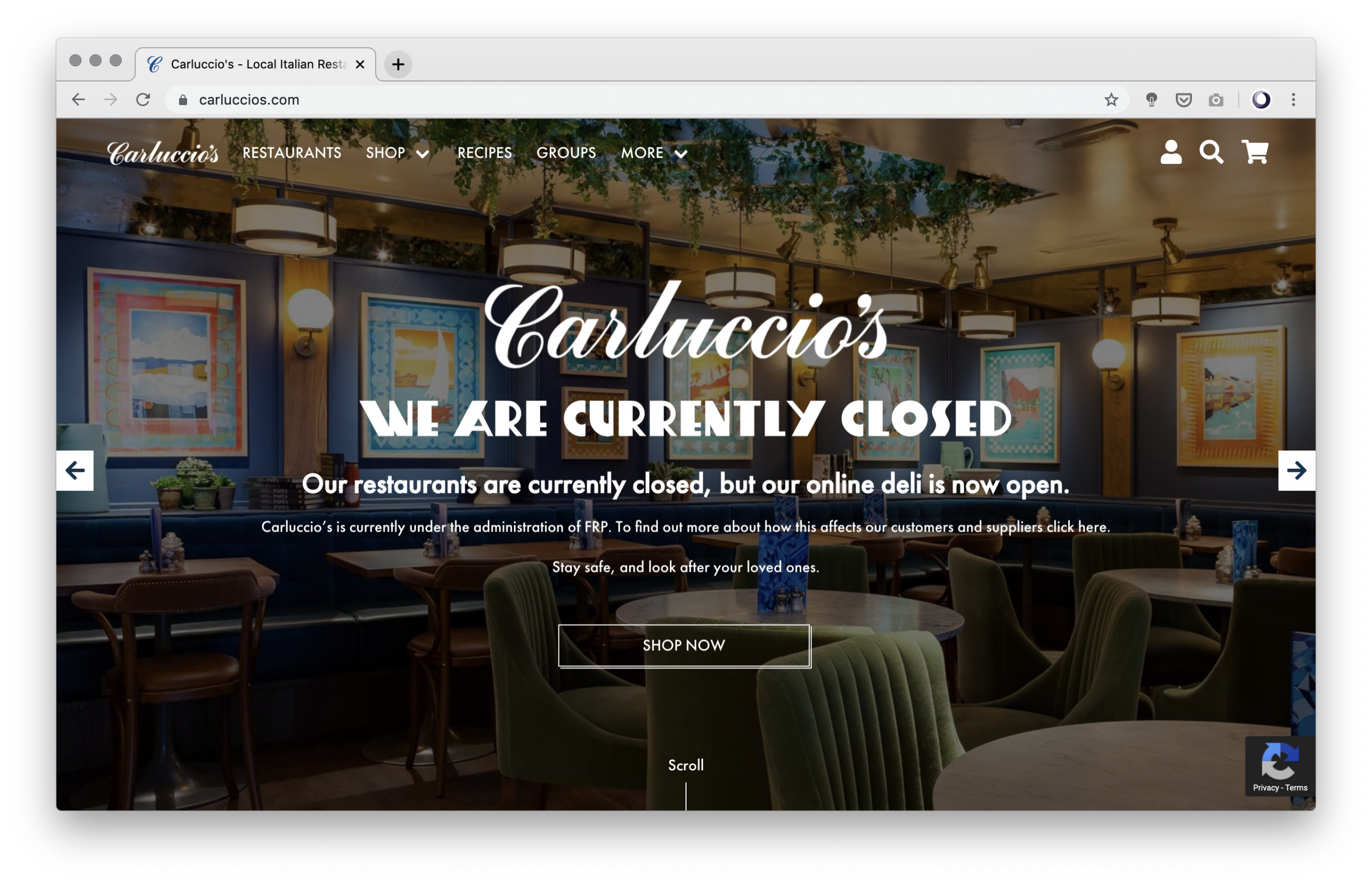
How the insolvency plays out in the media, and how stakeholder communications are managed, is key for the insolvency practitioners, too – who have their own personal and corporate reputations to manage.
While each insolvency or restructuring project is different, and coronavirus has thrown up its own distinct set of challenges, there are common factors which both define the reputational risk profile of the insolvency and influence the communications strategy.
At Infinite Global, we call this the Reputation in Restructuring Framework:
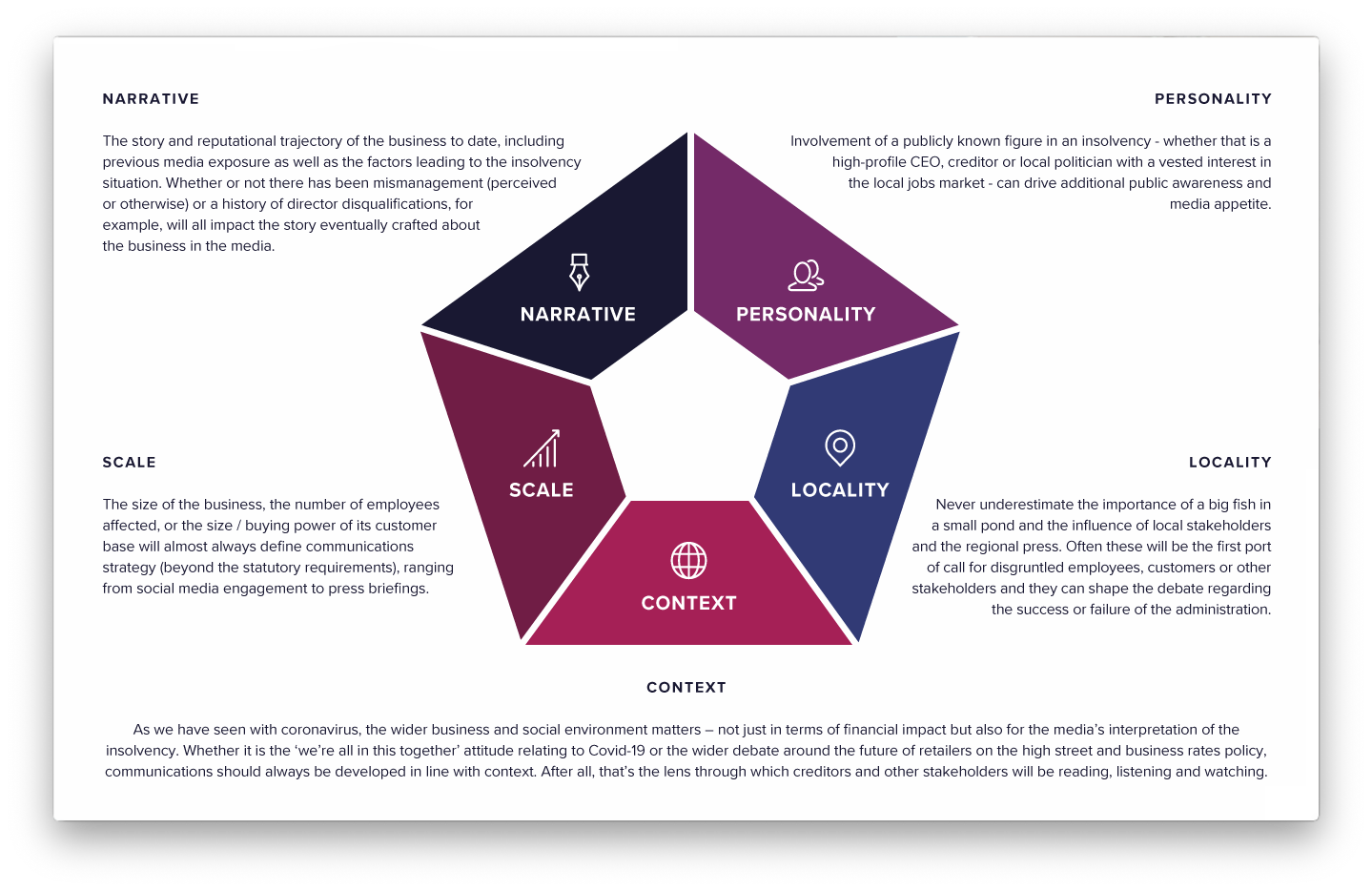
Infinite Global is an international communications firm which has served as the first (and last) port of call for journalists on the restructuring and insolvency of more than 130 companies. This has included some of the most high-profile administrations and liquidations in recent UK corporate history. Bringing to bear proven media handling protocols and infrastructure to ensure crisp response, we provide 24/7 support through our team of experienced crisis, corporate and media advisors.
Insolvency and restructuring
During the insolvency process, effective communications are essential. A wide range of stakeholders – employees, customers, suppliers, regulators, shareholders and capital markets – all require accurate and reliable information, fast.
Read More
Crisis and litigation
Infinite Global advises a wide range of domestic and international clients facing difficult scenarios in which reputational, legal and commercial risk is high. We advise organizations and individuals, providing counsel and tactical support to mitigate risk and protect reputations when it matters most.
Read More

